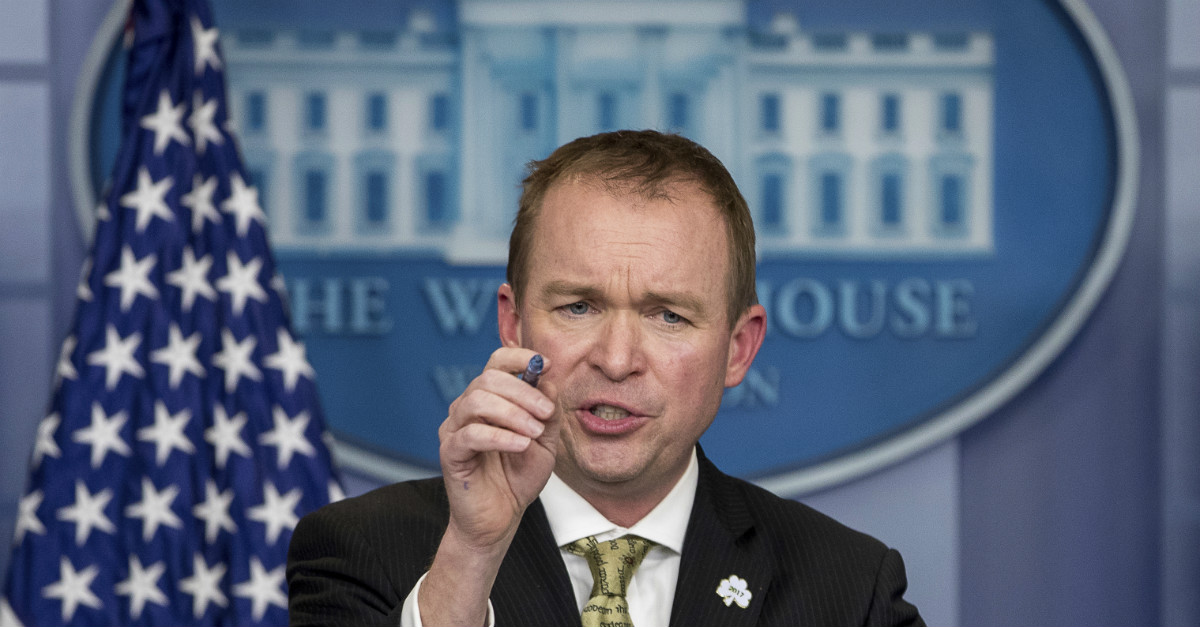Here’s the singular fact you need to know about Donald Trump’s first budget: in 2016, President Barack Obama proposed $1.15 trillion in discretionary spending; Trump has requested almost the exact same amount.
Videos by Rare
Don’t fault Mick Mulvaney, the fiscally conservative head of the Office of Management and Budget. This latest spending spree technically has his name on it, but it was also devised under strict constraints, namely that the defense budget had to be hiked by $54 billion, equivalent offsetting cuts had to be found, and not a single dollar could be plucked from entitlement spending. That left Mulvaney’s team rifling through the discretionary budget, only a slice of the federal government’s overall expenditures.
That they managed to pull off this unwieldy balancing act is a testament both to Mulvaney’s doggedness and the waste that’s infected every cranny of the bureaucracy. There’s a lot to like in Trump’s budgetary blueprint, from the blades falling on dozens of duplicative and ineffective programs to the money yanked away from UN climate initiatives to the shift of funding away from Washington’s already-massive land holdings. Problem is, it’s just that: a blueprint, a suggestion from the executive branch to Congress, which is ultimately charged with assembling the final draft.
If you think those cuts are going to survive the porky appropriations committees, you’re far more of an idealist than I am.
RELATED: The defense spending hikes are crazy — and other thoughts on Trump’s first budget
Begin with the slashes to rural programs, of which the budget features plenty, and which will draw prompt resistance from red-state Republicans whose congressional seats were won by holding a conservative rhetorical line while contradictorily bringing home all flavors of bacon. Think that $45 million reduction to the Delta Regional Authority, which provides economic development assistance for the southern (i.e. Republican) states of the Mississippi Delta, is going to remain intact? I wouldn’t bet on it. Nor would I put money on the GOP caucus risking the inevitable shrieks when they move money away from Meals on Wheels. Already Congressman Chris Collins, Republican of New York, has declared “I would never vote to cut even one dollar” from Meals on Wheels, and there will be more.
This is reckless, calcified, obtuse Washington, jerry-rigged to spend more upon more, with every solitary dollar guarded by a lobbyist or interest group or heartstring or all three, and every member of Congress motivated to bestow ever more corn museums and bridges to nowhere upon his constituents. It’s why the sequester was utterly necessary. It’s why our honorable representatives refuse to shutter military bases that even the profligate Pentagon says aren’t needed anymore.
Speaking of the profligate Pentagon, we approach now the real defect with Trump’s spending plan. According to a foreword statement from Trump himself, “One of the most important ways the Federal Government sets priorities is through the Budget of the United States.” That’s true and unfortunately this budget once again de-prioritizes American taxpayers to the dregs of the barrel, especially those of us who are young and doomed to inherit this $20 trillion debt boulder. Trump’s budget, remember, doesn’t really cut discretionary spending under what Obama requested; it merely shifts the money around. And when you factor in Congress’ inevitable markup, the president’s looming infrastructure plan, and the clinically insane Republican hawks who are demanding even more for defense, you see why this is ultimately going to hike net spending, not decrease it.
RELATED: The Pentagon commissioned a report on waste, and what they found was so bad they tried to destroy it
Instead of making the centerpiece of the 2018 fiscal year a lateral pass from the domestic agencies to the military-industrial complex, why not shoot for a serious net spending decrease? And if Trump won’t sleep at night until America has a flashier military than the Protoss Armada, why not reinvest in the armed forces money taken from the Pentagon’s civilian bureaucracy? Senator Tom Coburn, as I never tire of citing, found $69 billion in waste at the Defense Department going on GAO reports alone. Tell the congressional appropriators to start there, but that overall budget reductions are a red line, one this president actually intends to enforce.
Short of that, the only fiscal difference between Donald Trump and Barack Obama is a quibble over how to best bankrupt the country.



